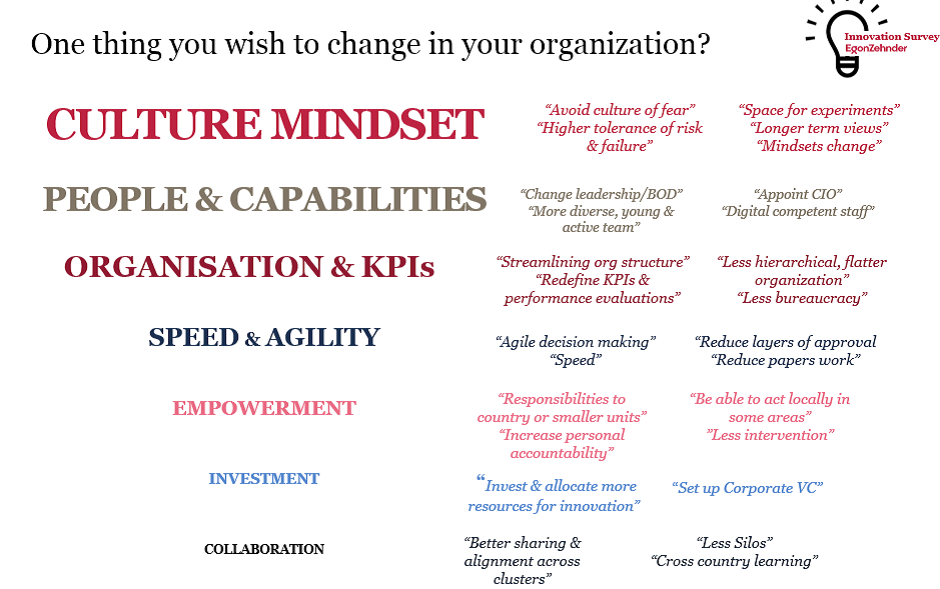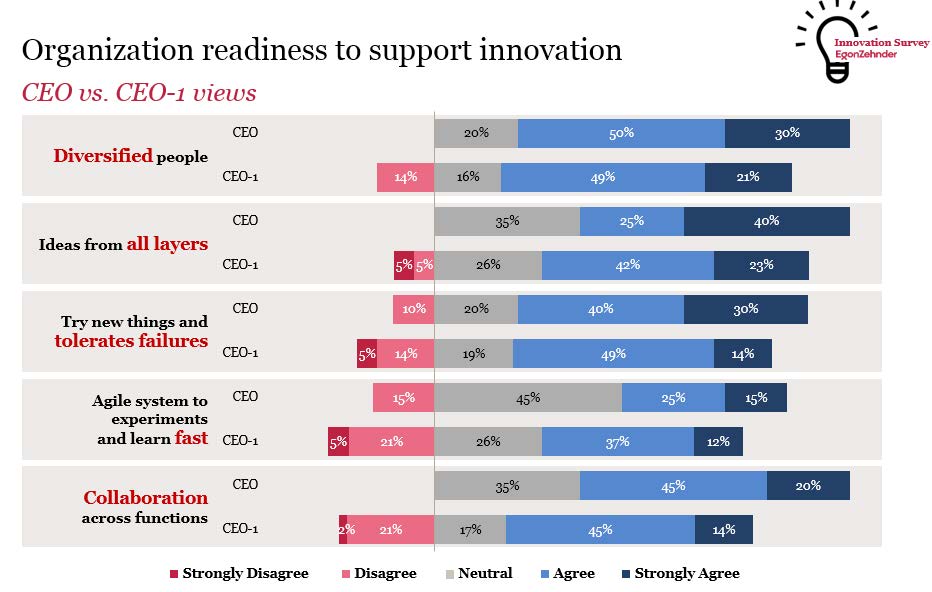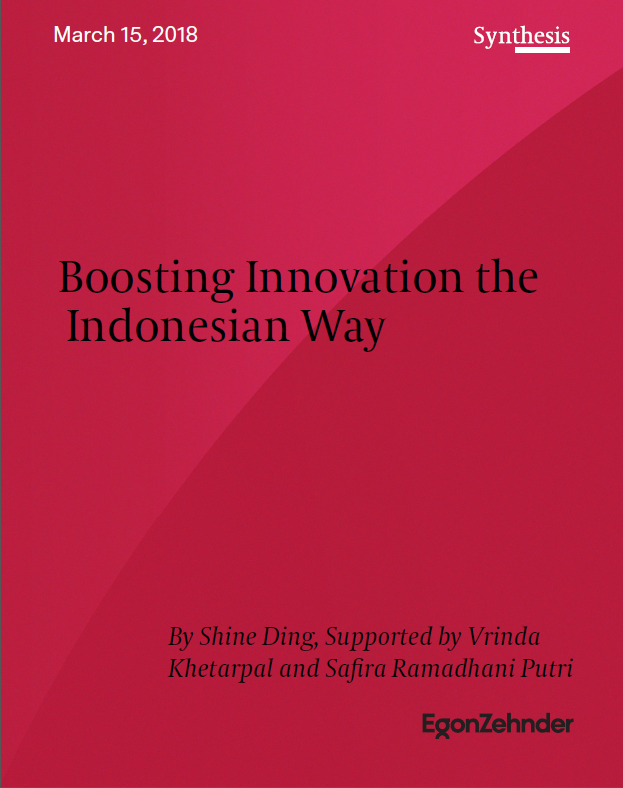As a steadily-growing trillion-dollar economy with a youthful, tech-savvy population, Indonesia is at once blessed with big-market opportunities and challenged by rapidly-changing customer expectations and the competitive global landscape. Not surprisingly, innovation has become a hot topic in the country. As a leadership advisory firm, we see how that’s changing our clients’ evaluation of job candidates and thinking about CEO successors, board composition and organizational structures. But even as they implement changes, Indonesian business leaders continue to grapple with tough questions, such as: How can we nurture open innovation in a culture that respects hierarchies? How can we ensure that mechanisms meant to unleash creativity don’t lead to havoc inside organizations?
Leaders here know that best practices from Silicon Valley don’t directly apply to the Indonesian business and cultural context. So what works in Indonesia? To find the answers, at the end 2017 Egon Zehnder brought together Indonesian business leaders from across sectors such as Fast Moving Consumer Goods (FMCG), transportation, banking, industrial and natural resources to share insights about innovation. Our participants came from companies with diverse ownership structures, ranging from MNC to local private businesses, and from state-owned enterprises to new startups.
With the help of a survey and three half-day, in-depth roundtables, we uncovered insights about how organizations are facing the challenge of innovation today and how they are pushing ahead in their search for potential solutions - many drawing on the unique characteristics of Indonesian society.
Indonesian business and IQ (Innovation Quotient)
Many recent innovations in Indonesia are directly related to technological advancements – digitalization, e-commerce, the shared economy. Indeed, three of the five digital Southeast Asian Unicorns - Go-jek, Tokopedia and Traveloka - are based in Indonesia. Still, there’s considerable room for improvement: 62% of CEOs surveyed said they are worried about innovation and see it both as an opportunity and as a threat. In the roundtable discussions, we heard them loud and clear: Indonesian businesses want to innovate, but many are not confident that their organizations can support innovation.
At Egon Zehnder, we draw on both our experience working with global talent and our collaboration with renowned Harvard Business School Professor Linda Hill to map out critical qualities companies need to lift their Innovation Quotient (IQ) - an organization’s ability to continuously drive new ideas. Critical factors for innovation include a capable and diversified talent base, a culture that encourages voices from all layers and tolerates failures and an organization that drives collaboration across teams and enables fast experimentation.

When asked our participants how ready their organizations are to support innovations. Most Indonesian executives found their enterprises to be lagging today, but also pointed to many changes they would like to make. Moreover, we found an interesting gap between the perceptions of CEOs and other senior executives who report to them such as COO, CMO, HR Directors and other key leaders. These executives are noticeably less optimistic than CEOs in their organizations’ IQ.

We at Egon Zehnder aim to adapt our global framework to the particular challenges and strengths inherent in Indonesia. The key to success, say business leaders, is finding a way to seize upon and harness key aspects of Indonesian society to turn cultural and societal factors into critical advantages. Consider the following challenges and how Indonesian business is overcoming them in creative, thoughtful ways to ultimately boost innovation.
Challenge: Talent shortage. Our survey and roundtables identified Indonesia’s talent deficit as a primary concern. Participants lamented that despite its large and young labor force, Indonesia has a considerable shortage of professional, technical and managerial talent, in part because of its colonial history and a weak education system. Many business leaders said the country’s regulatory systems also throw up cumbersome obstacles. “This is not China or India when it comes to talents,” observed the founder and CEO of one digital start-up.
Others pointed to the regulatory barriers to recruiting international talent. The CEO of an international bank homed in on tightened KITAS (expatriate work permit) regulations: “London and New York didn’t grow into major financial centers by just employing people from Birmingham or Minnesota,” he said. “We have to loosen up a bit in order to get the bigger prize.”
What’s working: Some organizations are finding that evaluating talent based on potential rather than focusing on qualifications and past experience yields better results. Key qualities can include fundamental intelligence, drive, learning ability and personality traits such as initiative-taking and a balanced ego. The CEO of one technology business shared that his company interviews 30 or more candidates for each engineering opening. Another solution is to invest heavily in in-house training and development as a way to organically nurture talent.
Challenge: Amplifying voices. In Indonesia, innovation must be adapted to societal norms. Organizations in Indonesia must contend with a culture that puts a premium on reticent, deferential behavior and even timidity before authority figures such as managers, department heads and the CEOs.
What’s working: Companies are creating new channels of communications and dialogue to encourage employees to open up and share ideas more readily. The CEO of a media company has found that setting up informal small circles and even one-on-one conversations can get team members to open up, “Even when a person is fully fluent in English, he will share more real thoughts when speaking Indonesian Bahasa or speaking privately.”
According to another CEO, prompting team members to share ideas in writing can help introverted employees feel more comfortable. Technology is also breaking down barriers. Some companies are encouraging front-line employees to share stories in real time via Whatsapp messages and even videos.
Participants were also hopeful that the entry of Generation Y into the workforce will be a game-changer because younger employees feel less constrained by hierarchies and are more entrepreneurial. The HR Director of one incumbent telco went so far as to suggest appointing Gen Y staff as “reverse role models” to spearhead new initiatives such as adopting paperless communications and social media marketing.
Challenge: Community dynamics. Indonesian culture places a high value on community wellbeing and social integration. This can make innovation harder because people hesitate to stand out for fear of being conspicuously different. At the same time the same societal desire for harmony can be a boon to the formation of a team dynamic that generates ideas – especially when people care about something.
What’s working: Stressing a direct link between products or services and the local community or Indonesian society at large provides motivation and an enhanced sense of purpose. It also leads to innovations like Muslim beauty products. Beauty brands like Wardah and Mustika Ratu have a variety of offerings, made in accordance with Halal standards, that are suitable for Hijab-wearing customers—a truly underserved market. Or consider the success of non-alcoholic beers flavored to Indonesia tastes, such as Guinness Zero and Bintang Radler.
A local food giant which has worked to grow its dairy business found that stressing customers as people rather than focusing exclusively on driving profits was the best motivation for its sales force. That meant framing the mission as, “helping more mums to give their babies and kids the right nutrition,” a message that delivered almost immediate results. Through this positioning, the company was able to get a lot more ideas and initiatives by the field sales organization.
Challenge: Fear of failure. Indonesia is not the only culture where mistakes are taboo, but perhaps this tendency is more pronounced here. In this sort of environment, tolerating failure may not be enough to build a culture of innovation.
What’s working: Some companies are going all out to celebrate creative initiatives even when they have failed. They know that the very essence of innovation stems from an organization-wide feeling that trying new things is always appreciated, even if they come up short. The marketing department of a large telco once came up with a catchy, unconventional campaign to promote the company’s network: “It’s quicker to go to Australia than to go to City X.” (City X is a small city outside Jakarta that is notorious for bad traffic). The ad caused a backlash that led to a lawsuit filed by City X’s municipality.
The company’s BOD mulled this over : “It clearly costs us a lot of money, but the question was ultimately whether we should punish the marketing department?” The decision was no. Instead, company leadership praised marketers for their bold move while acknowledging that a mistake was made. “If we don’t make mistakes we don’t learn,” says the HR Director.
Challenge: A safe space for innovation. In a market where efficiency is highly valued, it’s risky to try to change whole organizations. The CEO of a local conglomerate said: “In many cases, it is the unsexy old businesses that provide stable profit to support the innovations. So, we have to handle the traditional business with focus and care, while driving innovation.”
What’s working: Incubating new businesses separately and on their own is a viable solution. Some companies are carving out new teams or even new entities with special responsibilities and accountability. Housing new initiatives independently this way can leave an organization’s stable operations intact while giving new initiatives full freedom and end-to-end accountability, with a different team setup, processes, culture and evaluation systems. A global leader in the beverage industry calls the new groups “Future Teams”. “That way, we gave them focus and freedom to innovate, while not letting the rest of the organization drop the ball.”
In a society steeped in tradition like Indonesia, figuring out the right way to stimulate innovation rests on striking the balance between the past, the present and the future. Companies that are willing to take the pain and show patience to do it right will ultimately be rewarded—with a significant competitive advantage over their competitors.






